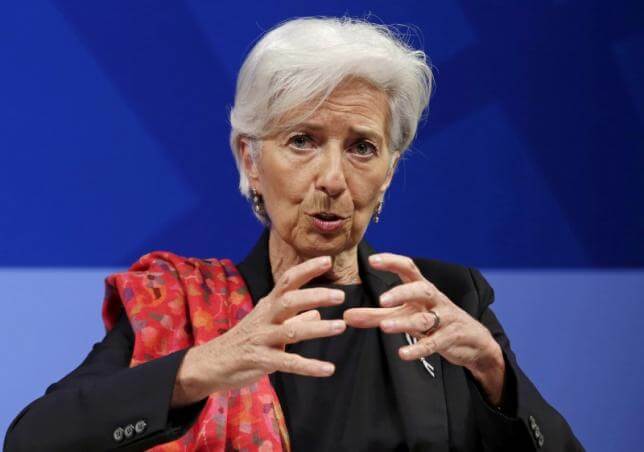Having witnessed the 2008 financial crisis and the subsequent eurozone debt crisis, Europe’s policymakers should already realize what the COVID-19 pandemic could mean for the economy. To avert a self-perpetuating downward spiral, the European Central Bank, in particular, will need to start thinking outside the box.
BRUSSELS – The coronavirus pandemic has triggered a combined negative supply and demand shock of unprecedented intensity. Both are having a significant impact on the production of goods and services, and because everyone’s income ultimately derives from production, household incomes are quickly falling. With many economies already in a downward spiral and heading toward recession, the danger is that the downturn will become a self-perpetuating and ever-deepening rout.
The twin supply and demand shocks are likely to trigger many “domino effects.” Companies with large fixed costs that suffer a sudden fall in income will quickly face financial difficulties, or even bankruptcy. When that happens, the banks and other entities that have lent money to these companies will also be in trouble. That is why massive economic shocks often can lead to banking crises.But the falling dominoes don’t stop there. Governments, too, can face fiscal dangers when they step in to mitigate the crisis. In the case of the current pandemic, national governments will need to save businesses from bankruptcy by granting financial support and subsidies, assist workers by funding temporary unemployment schemes, and possibly even come to the rescue of large banks. Worse, all of this must be done at a time of declining tax revenues, which means that government deficits and public-debt levels will skyrocket.
We saw how these domino effects work during the 2007-2008 financial crisis. The difference now is that the initial shock did not start in financial markets and then spill over into the real economy. Rather, today’s shocks emerged from the real economy and have toppled financial markets. But, as in the past, this crisis demands urgent measures to put more space between the falling dominoes. Think of it as macroeconomic “social distancing.”What would this look like in practice? First, national governments must intervene on a massive scale to provide financial support for distressed companies and households whose earnings are at risk. Most European governments already seem to be willing to do this. The problem is that large-scale fiscal expansions by eurozone member states could prove tricky. It is thus critical that the European Central Bank step in to prevent the last domino – member-state governments – from falling.Because they have no choice but to support failing companies, illiquid banks, and struggling households, national governments could be entering dangerous territory. The more their debt increases, the greater the risk that their bondholders will panic, as we saw during the 2010-2012 sovereign debt crisis. And the countries experiencing the largest debt increase as a result of the “coronacrisis” – Italy, Spain, and France – are among the four largest eurozone
To head off the risk of a bond-market panic, the ECB should be preparing to buy up distressed governments’ bonds. During the 2012 crisis, the ECB laid the groundwork for such a response with its outright monetary transactions program. But earlier this month, ECB President Christine Lagarde seemed to suggest that the bank would not come to the rescue of indebted member states, only to walk back her remarks days later. Even so, given that her initial statement was applauded by Bundesbank President Jens Weidmann, there remain serious doubts about whether the ECB will offer direct support to national governments.To be sure, the ECB has promised to serve as lender of last resort to European banks and has reactivated its quantitative-easing program, through which it will buy additional government bonds in the secondary markets. But while QE will provide some relief to national governments, it will not be sufficient. The ECB must go one step further, by preparing to buy government bonds in primary markets, effectively issuing money to finance member states’ budget deficits during the crisis.If the ECB engages in monetary financing of member states’ budget deficits, it will likely be joined by many other central banks around the world. The virtue of such an approach is that it spares national governments from having to issue new debt. Because all new debt would be monetized, the crisis would not increase government debt-to-GDP ratios. For those countries suffering the worst of the pandemic, the threat of a bondholder panic will have been removed from the equation.
Yes, one could raise many objections to this proposal. As a legal matter, the Treaty on the Functioning of the European Union forbids the ECB from engaging in monetary financing of national budget deficits. But ECB lawyers, with their unbounded ingenuity, could surely find a way around this restriction. After all, the very future of the eurozone depends on it.One also might object on the grounds that monetary financing would produce inflation. Yet under the current circumstances, there is simply no chance of this. If anything, Europe is now facing a deflationary spiral; monetary financing would militate against this trend. As soon as the deflationary dynamic had been stopped, the ECB could halt its monetary financing.Sooner or later, the ECB must accept that monetary financing in support of deficit spending is a necessity not just for mitigating the COVID-19 crisis, but also for averting a downward deflationary cycle that could pull the eurozone apart. It is time to think outside the box.
Published atwww.project-syndicate.org











